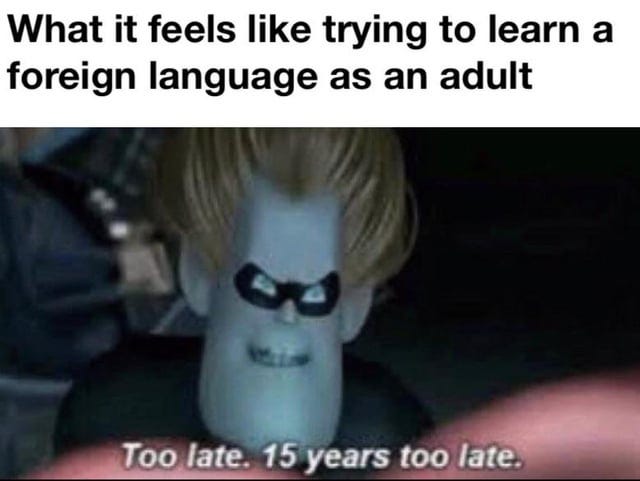You can't show up late to your own life
It's never too late to learn
Welcome, aspiring polyglot! As the new year rapidly approaches, I wanted to take a moment to discuss a topic that has been prevalent since I began doing this. That is, what age should someone begin learning a language at? Most of you probably know my answer. As early as possible. However, if you find yourself as working adult with many more obligations than wake up, go to school, go to sleep, it can be daunting. Still, if you have waited, now is the earliest possible.
You can learn at any age
Over the last year I have worked with dozens of working adults, many of whom have families. The average age of my private students is 40. Yet, within three months they are able to reliably speak their new language, albeit fluency is still a ways off. Though, if you could begin speaking your target language at age 40 after only 3 months, why would you wait any longer than you already have?
People often say that kids learn languages faster and it is true. The neuroplasticity that children enjoy offers them a large advantage when it comes to learning just about anything, not just languages. However, there is more to it than simple neuroplasticity. Kids also enjoy an extremely responsibility free life which not only opens up their time, but their mental bandwidth.
Imagine with me for a moment that I were to offer to pay your bills and cook your meals for a year, all you had to do was focus on learning the new language. Do you think you could do it then? I do. Learning a new language also comes with the added bonus of increasing or at least preserving neuroplasticity in adults. In a way, learning a new language literally makes it easier for you to learn new things.
Try not to forget all of the advantages adults have over children as well. There is much to be said for the influence that life experience has on the learning process. In just about every class I’ve had, people have seen or spent at least several days worth of hours around their target language. That is to say, even if they didn’t know what it meant when they saw it the first time, seeing it the second time is seeing it for a second time. This is more powerful than most people realize.
Slow and steady wins the race
Something that often happens in early education is a race of intensity. Learning as much possible in as little time as possible. The public education system is a symbol of this idea now as they try to squeeze 6 subjects into 6 hours. This often leads to warped beliefs about what is good and what is necessary during any form of education. With languages, and most other things, however, consistency beats intensity 364 days out of 365.
Continuous education is crucial as we age and, for anyone who is in the trenches, the only solace I have to offer is that practice makes permanent. Another advantage that adults have over children is that things stopped happening quickly years ago. Due to that natural occurrence, many adults are more resilient in their dedication to the tasks at hand. While there is an epidemic of short attention spans caused by an all out assault of hyper stimulation, any adult who can sit and focus for 1-2 hours a time is already ahead of most youngsters.
Finally, by the time you break into your 30s, the idea that timelines are always going to be adhered to has come and gone. This may not seem like an advantage at first, but under closer inspection it becomes clear. Once you take the pressure off of yourself and realize that there is no such thing as “too long” you can jump into your language work stress free. Most of the time, at least in my own personal experience, once an arbitrary deadline has passed, many give up. Simply pushing on already puts you in the top 10% of learners, irrespective of your age.
It won’t take as long as you think
While for many people language acquisition takes years, that is not necessarily the standard. In many cases, you can and should be able to communicate fluidly with people in your target language after 3-6 months. Now, fluency, on the other hand, might take years. But you do not need to be fluent in a language in order to communicate in it. In fact, much of the communication you do in your target language will happen long before you would ever consider yourself fluent.
As an adult, you are on your own timeline. You set your deadlines. The material that you study is your choice. Any amount of time you choose to dedicate to this endeavor is time you chose to spend. This freedom can be paralyzing, but once you get beyond the point of analysis paralysis, taking control of your education is one of the most empowering things you can do. Remember to check out our FREE PDFs if you need a jumpstart on resources.
Perhaps the most comforting aspects of striving for bilingualism and beyond is that, with languages, once it’s done, it’s done. Meaning, after you have the language to a point where you can understand everything and express any sentiment your heart desires, the maintenance requisite to upkeep your skills is negligible. Have you ever found yourself outright studying your native language? Probably not.
So long as you integrate your new language(s) into your life, after a certain point you no longer need to sit down for dedicated studying. Of course, this means you must fight for as much immersion as possible, replacing things you would normally do in your native language with things you do in your new language(s), but that part is enjoyable. Don’t wait another year to take advantage of all the things bilingualism has to offer you. The longer you wait, the longer it’ll take.
Conclusion
The longer you wait, the longer it will take. With the new year rapidly approaching, I encourage you all to start your journey to completing your goals now. I love New Year’s Resolutions. However, I am not a fan of making them on the New Year. There is absolutely no reason to wait for an arbitrary day to begin striving for your goals. Make 2025 the year you finally begin using your new language(s). Better yet, use them to accomplish the other goals you have.
If you know anyone else who is trying to get a new language under their belt this coming year, be sure to send them some of our free resources as well. With over 50% of humans being bilingual, it is time to increase the numbers in our ranks. It will be difficult, but you can do difficult things and be great. So get out and get some difficult things done to become great. I’ll be here rooting for you, through 2025 and beyond.
Requests
If you have anything you would like covered you can reach out to me on X, Instagram, or at odin@secondlanguagestrategies.com.
Additional Resources
Don't want to spend time playing catch up? Pick up the 3 Months to Conversational book now available on Amazon! 3 Months to Conversational
For more long form content be sure to check out the website!
Subscribe for new content on YouTube and TikTok!
Learning Spanish? We have begun aggregating resources in you Spanish Resource Newsletter!
Don't forget to pick up your very own French Language Logbook or Spanish Language Logbook!






